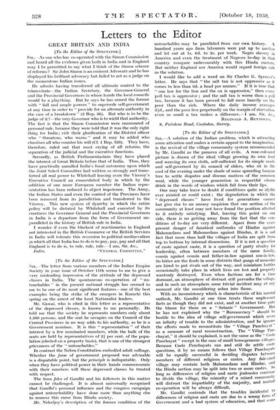Letters to the Editor
GREAT BRITAIN AND INDIA
[To the Editor of the SPECTATOR.] Sia,—As one who has co-operated with the Simon Commission and heard all the evidence given both in India and in England may I be permitted to say what I think of the Simon scheme of reforms? Sir John Simon is an eminent Advocate and he has displayed his brilliant advocacy but failed to act as a judge on the momentous Indian issues.
He admits having transferred all ultimate control to the triumvirate—the Indian Secretary, the Governor-General and the Provincial Governors in whose hands the local councils would be a plaything. But he says he has armed the former with " full and ample powers " to supersede self-government at any time in order to " provide for an alternate authority in the case of a breakdown " (2 Rep. 36). But who is to be the judge of it ?—the very Governor who is to wield that authority. The fact is that the Simon Commission were enamoured of personal rule, because they were told that it was the only right thing for India ; vide their glorification of the District officer who " threatens, who warns " and it may be added who chastises all who counter his will (Cf. 1 Rep. 320). They have, therefore, ruled out that most crying of all reforms, the separation of the judicial and the executive functions.
Secondly, as British Parliamentarians they have placed the interest of Great Britain before that of India. Thus, they have practically annulled India's fiscal autonomy upon which the Joint Select Committee had written so strongly and trans- ferred all real power to Whitehall leaving even the Viceroy's Executive Council an emasculated body in which by the addition of one more European member the Indian repre- sentation has been reduced to abject impotence. The Army, the Indian States and even the control of the Provinces have been removed from its jurisdiction and transferred to the Viceroy. This new system of dyarchy in which the entire policy will be dictated by Whitehall and executed by its creatures the Governor General and the Provincial Governors in India is a departure from the form of Government un- paralleled in the history of British rule in India.
I wonder if even the blackest of reactionaries in England not interested in the British Conunerce or the British Services in India will tolerate this reversion to political medinevalism in which all that India has to do is to pay, pay, pay and all that England is to do is, to rule, rule, rule.—I am, Sir,
























































 Previous page
Previous page